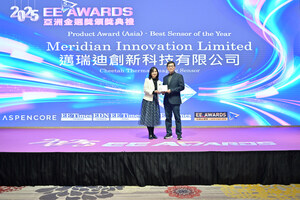
Meridian Innovation Enhances Capabilities of Thermal Imaging Technology
TAIPEI, Dec. 16, 2024 /PRNewswire/ -- Meridian Innovation has done it again. The company has received the Innovation R&D Award at EE Awards Asia 2024, organized by EE Times Asia, for its Visual FID and Panther Thermal Imaging Sensor. This is the second consecutive year that the company has won the same award, underscoring its intense focus on innovation.
Meridian is the pioneering developer of complementary metal-oxide semiconductor (CMOS) thermal imaging solutions that enable mass producible long-wave infrared (LWIR) products for consumer and commercial applications. According to COO Hasan Gadjali, the company was found with the mission to enhance safety, security, and comfort by making thermal imaging available to the consumer and commercial market.
"We developed a revolutionary thermal imaging sensor that can be manufactured at large scale for the mass market using standard CMOS processes and in a very cost-effective way. Thermal imaging detectors sense heat, and the array of sensors allow us to perceive thermal contrast, creating an image of the 'invisible' temperature scene," says Gadjali.
Panther is Meridian's third thermal imager product using the company's second generation 35-micron pixel technology but is four times the resolution—160x120 pixels—of its previous two products.
"The higher resolution and improved sensitivity provide more details, opening a whole lot of new applications—from home security to elderly care to wellness monitoring," says Gadjali. "Face identification, in short face ID, with anti-spoofing is one such application."
According to Gadjali, while face ID is being used routinely for authentication, logging in, and getting access to physical or digital assets, there are still ways to spoof such system either by showing a printed picture or even a highly realistic 3D-printed mask.
"This is a serious problem because spoofing leads to unauthorized access," he says.
This is where Meridian Innovation comes in. Its thermal imager technology—through long-wave infrared, or LWIR sensing—complements visual sensing, thereby elevating the security of face ID, and potentially even improving the accuracy of identifying the correct person, not someone with a 3D mask who lacks the face temperature map signature characteristic that is intrinsic to a live human being.
"With visual and thermal imaging combined, we develop the algorithm needed to jump start those companies who want to build a service around this kind of technology," says Gadjali.
The figure below illustrates how it can be done.
Utilizing standard CMOS process
Meridian's technology is developed using CMOS processes that have unprecedentedly low-cost manufacturing capacity for mass market, while maintaining very high-performance metrics, including wide operating temperature range.
"We develop the entire solution with these constraints in a single chip, from pixels array to readout circuitry, from lens to module and even the image-processing controller. This is a total solution for quick adoption to markets," says Gadjali.
According to him, face ID anti-spoofing by using both thermal and visual modalities is not entirely new as it has been researched mostly in academic context—but with expensive high-end thermal cameras. For the technology to really have a social impact, the thermal camera must be affordable to be deployed into mass market devices such as smartphones, tablets and laptops, just to name a few.
"Our development demonstrates that it is possible to achieve the desired anti-spoofing at the right price points, one of the first, for mass markets," says Gadjali.
Its latest winning product, the Panther module with Face ID technology, is envisioned to be extended into health and wellness-related monitoring. Its core platform pivots around the SenXor fusion between the thermal and visual modalities, which enable monitoring of various physiological parameters on a regular basis, which is very important for early detection any health conditions for preventive medical applications.
"We are grateful for the award and take it as a nod of appreciation by the community to our vision, efforts, and execution skills," says Gadjali. "We are on the way to achieve our third-generation technology, which could further shrink our pixel sizes without sacrificing too much sensitivity. This will result in smaller die for the same array size to build into a small module, hence making more affordable and applicable to compact smartphones."
Moving forward
The current geopolitical climate and the continuous trend toward localizing supply chains is expected to continue to create pivotal shifts for the semiconductor sector over the next years. And at the forefront of these changes are innovations in AI supply chains to help the growth of semiconductor industries.
"These new innovations are excellent opportunities for sensor design companies like Meridian Innovation," says Gadjali. "With our recent closing of $12.5 million in funding, and, after more than eight years of development and evangelizing the use of thermal sensors for the consumer markets, Meridian Innovation finally is at the junction of exponential growth."
With the right innovation, technology and products addressing the new mass consumer markets, together with AI, Gadjali expects demand for their thermal imaging solutions to increase significantly in the coming months, as Tier 1 brands continually adopt their low-cost CMOS thermal imaging solution for their smart applications.
SOURCE EE Times Asia





Share this article